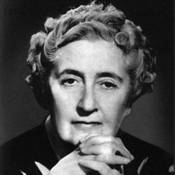
Agatha Christie plaque -Torre Abbey CC BY-SA 3.0 via Wikimedia Commons
Agatha Christie
Playwright
Biography
Agatha Christie
Agatha Christie, one of England’s most celebrated mystery novelists and playwrights, lived a life as captivating as any of her fictional plots. Born on 15 September 1890 in Torquay, Devon, Christie grew up in a comfortable upper-middle-class family. Her mother, Clara, strongly influenced her upbringing, encouraging her imaginative side and claiming psychic abilities, which fascinated young Agatha. Rather than playing much with other children, Christie preferred books, solitary games, and her pets—including a dog memorably named George Washington.
As a young woman, Christie traveled with her mother to Egypt, a journey that exposed her to a new world of ancient ruins and foreign culture. Though she was not immediately interested in archaeology, the experience stayed with her and would later inspire the exotic settings of several novels. When World War I broke out, Christie trained as a nurse and later worked in a hospital dispensary in Devon, where she acquired knowledge of medicines and poisons. This experience directly informed her later fiction, in which poison often features as a method of murder.
Christie published her first novel, The Mysterious Affair at Styles (1920), introducing the brilliant Belgian detective Hercule Poirot. The novel launched her career, beginning a literary journey that would ultimately span more than five decades. Yet Christie herself became the subject of her own real-life mystery in 1926, when, after her husband Archie asked for a divorce, she disappeared for eleven days. The disappearance gripped the press on both sides of the Atlantic and remains unsolved to this day, adding to the aura of mystery surrounding her life.
Over her lifetime, Christie wrote 66 detective novels, 14 short story collections, and six romances under the pseudonym Mary Westmacott. Her best-selling novel, And Then There Were None (1939), is regarded as the best-selling crime novel of all time. Christie also made a lasting contribution to the stage: she adapted many of her works for the theatre, often with remarkable success. Her play The Mousetrap (1952) became a cultural phenomenon and is recognized as the longest-running play in the world, still performed in London’s West End decades after its premiere. Other stage adaptations, such as Witness for the Prosecution (1953) and Appointment with Death (1945), cemented her reputation not just as a novelist but as a skilled dramatist who could translate suspense and intrigue into live performance.
Christie’s personal life also connected her with the world of archaeology. Her second marriage, to archaeologist Sir Max Mallowan, brought her on expeditions to the Middle East, where she drew inspiration for novels such as Murder in Mesopotamia (1936) and Death on the Nile (1937). These journeys combined her love of storytelling with vivid firsthand settings.
In recognition of her extraordinary literary achievements, Christie was appointed Dame Commander of the Order of the British Empire (DBE) in 1971. She died on 12 January 1976 at the age of 85, leaving behind a legacy of enduring characters, ingenious plots, and theatrical milestones. Her works—both on the page and on the stage—continue to entertain, inspire, and mystify audiences around the world.
Shows
Shows associated with Agatha Christie
Monologues
Monologues from shows associated with Agatha Christie
Scenes
Scenes from shows associated with Agatha Christie
Videos
Videos associated with Agatha Christie
Quizzes
Quizzes associated with Agatha Christie
Additional Information
[Agatha Christie](http: //www.agathachristie.com/)